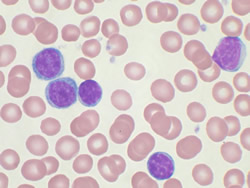Last updated:
NIH and non-profits sign research and development agreement

National Human Genome Research Institute (NHGRI)
www.genome.gov
National Heart, Lung and Blood Institute (NHLBI)
www.nhlbi.nih.gov
NIH and non-profits sign research and development agreement
 |
The cooperative research and development agreement has been established as a shared commitment to move therapies for rare blood cancers into clinical proof-of-concept studies so that promising treatments can eventually be commercialized. The agreement is among the University of Kansas Medical Center, Kansas City, The Leukemia & Lymphoma Society (LLS), the NIH Therapeutics for Rare and Neglected Diseases (TRND) program and the Hematology Branch within the National Heart, Lung and Blood Institute.
"The goal of this collaboration, called The Learning Collaborative (TLC) is to bridge the gap in time and resources that often exists between basic research and human testing of potential new treatments and accelerate and make more efficient the delivery of improved therapies to patients with rare blood cancers," said Christopher P. Austin, M.D., director of the TRND program, currently administered by the National Human Genome Research Institute, a part of NIH. "As a result of our work, as the TLC name implies, we plan to learn more about and improve the drug development process for all diseases."
"This agreement recognizes that academic, philanthropic and patient organizations have a role - and a responsibility - to be active leaders in the drug discovery process," added Roy A. Jensen, M.D., director, The University of Kansas Cancer Center, Kansas City. "I hope this agreement can serve as a model to other academic and patient communities."
The collaboration's first project is a pilot effort under the TRND program that focuses on further development of an existing small molecule drug used to treat arthritis called auranofin. Auranofin will be evaluated as a treatment for relapsed chronic lymphocytic leukemia (CLL) - one of the four major types of leukemia and one that typically affects older people. The goal is to accelerate the development of this drug and complete preclinical through clinical trial studies within two years, at which time an industry partner will be engaged.
Approximately 15,000 people in the United States receive a diagnosis of CLL each year.
CLL is currently treated with various chemotherapies, but patients eventually reach a stage where they become resistant to this treatment and can die as a result. In addition, chemotherapy can be quite toxic, whereas auranofin has received regulatory approval and was demonstrated to be reasonably safe and effective in the treatment of arthritis.
"Chronic lymphocytic leukemia is a complex disease that, while treatable, cannot be cured with chemotherapy," said Adrian Wiestner, M.D., Ph.D., an investigator in the NHLBI's Hematology Branch. "There is an especially urgent need to develop novel therapies for chemotherapy-resistant disease, and through this agreement the Hematology Branch can bolster its clinical and translational research program in this disease as well as other hematologic conditions with unmet clinical needs."
"Development of new therapies for diseases like the blood cancers poses both scientific and economic challenges," said Dr. Louis J. DeGennaro, Ph.D., executive vice president and chief mission officer, LLS. "Partnerships are the key to addressing this significant unmet medical need and LLS is proud to add our expertise to this collaboration."
The Institute for Advancing Medical Innovation (IAMI) at the University of Kansas, Kansas City, focuses on research and education with an emphasis on product development and commercialization of novel medical innovations to accelerate the numbers and quality of new drugs and devices; and ensures an entrepreneurship focus of the next generation of innovators. IAMI leverages the Kansas region's impressive history in drug development by partnering with nearby companies to perform all the functions needed to take innovative products to market.
The Leukemia & Lymphoma Society (LLS) is the world's largest voluntary health organization dedicated to funding blood cancer research, education and patient services. LLS's mission: Cure leukemia, lymphoma, Hodgkin's disease and myeloma, and improve the quality of life of patients and their families. Since the first funding in 1954, LLS has awarded more than $700 million in research funding.
The National Institutes of Health (NIH) Therapeutics for Rare and Neglected Diseases (TRND) program, http://trnd.nih.gov is a congressionally mandated program to encourage and speed the development of new drugs for rare and neglected diseases. This unique program creates a drug development pipeline within the NIH and is specifically intended to stimulate research collaborations with academic scientists, non-profit organizations, and pharmaceutical and biotechnology companies working on rare and neglected illnesses. The TRND program provides an opportunity to partner with, and gain access to, drug development scientific capabilities, expertise, and resources in a collaborative environment with the goal of moving promising therapeutics into clinical testing.
NHGRI is one of the 27 institutes and centers at the NIH, an agency of the Department of Health and Human Services. The NHGRI Division of Intramural Research develops and implements technology to understand, diagnose and treat genomic and genetic diseases. Additional information about NHGRI can be found at its website, www.genome.gov.
The NHLBI plans, conducts, and supports research related to the causes, prevention, diagnosis, and treatment of heart, blood vessel, lung, and blood diseases, and sleep disorders. The Institute also administers national health education campaigns on women and heart disease, asthma and chronic obstructive pulmonary disease, and other topics. NHLBI press releases and other materials are available online at www.nhlbi.nih.gov .
About the National Institutes of Health (NIH): NIH, the nation's medical research agency, includes 27 Institutes and Centers and is a component of the U.S. Department of Health and Human Services. NIH is the primary federal agency conducting and supporting basic, clinical, and translational medical research, and is investigating the causes, treatments, and cures for both common and rare diseases. For more information about NIH and its programs, visit www.nih.gov.
Contact:
Geoff Spencer, NHGRI
301- 402-0911
spencerg@mail.nih.gov
NHLBI Communications Office
301-496-4236
nhlbinews@mail.nih.gov
The Leukemia & Lymphoma Society
Andrea Greif
914-821-8958
andrea.greif@lls.org
University of Kansas Medical Center
Donna Peck
913-588-5956
dpeck@kumc.edu
